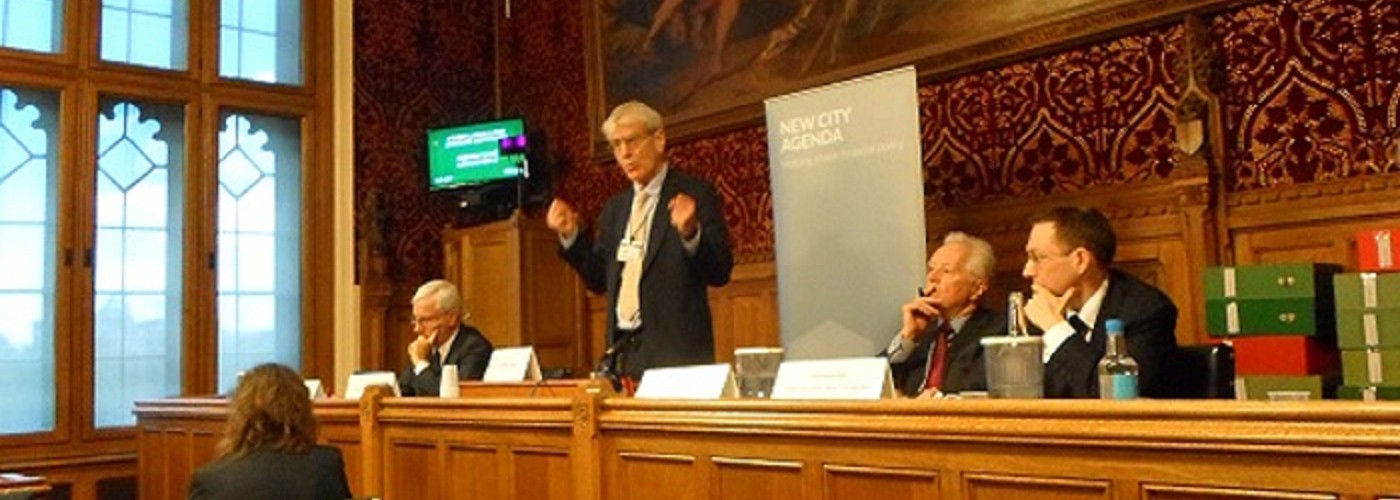Thoughts on Sir Richard Lambert’s Lecture
During last Wednesday’s successful launch of New City Agenda, held in Parliament, Sir Richard Lambert delivered an insightful and thought-provoking lecture.
1. Why is the culture of the banking system the way that it is?
Sir Richard, set out a potted history of banking, taking everyone back to the 1970s when people employed by banks were well paid but not astonishingly so. Risk taking was minimal as was the amount of risk capital employed.
The City was built on a network of partnerships, putting heavy constraints on risk taking activities since partners were using their own money, as opposed to that of outside shareholders. The business was almost entirely domestic.
In 1979, the removal of Foreign exchange controls and the Big Bang of 1986 which removed restrictive practices, took out most of the partnerships, and opened the door to the big investment banks of the US and continental Europe. The banking system exploded in terms of size and its willingness to take risks. The Free market ruled and the belief was that any regulatory intervention by Government was likely to make matters worse, rather than better.
It was not until 2008, that the errors of this judgment were fully exposed. As well as bankers, Sir Richard argued that policymakers, regulators, the media and wider civil society itself, must all take some of the responsibility for their actions during the first decade of this century.
2. What needs to be done?
Sir Richard began by saying that rebuilding trust is the most important issue. The banking industry is built on trust and the loss of it inevitably leads to a growing burden of regulation to take its place. He argued that after all that has happened in the last decade or two, a new approach by the banking sector is essential to the wellbeing of our society.
He went on to explain how he had been tasked with taking forward the recommendation of the Parliamentary Commission on Banking Standards. A new professional standards body for banks. He also announced that he would be publishing his Banking Standards Review the week after, following a considerable consultation process. The new body will set voluntary standards, be funded by Britain’s six biggest banks and the largest building society and will review the whole banking system.
He has identified three broad areas of activity for the new body.
- It will identify activities where voluntary standards would serve the public interest, and work with practitioners and relevant stakeholders to draw them up.
- It will work with the banks and the professional bodies that are already active in the banking industry to increase the value placed on professional qualifications.
- It will require participating banks to commit to a programme of continuous improvement under the headings of culture, competence and customer outcomes, and to report back on their progress to the public each year.
It was on this final point that Sir Richard mentioned how keen he was on New City Agenda’s Project that will explore the metrics and benchmarks that could be used to assess the success or otherwise of banks’ attempts to improve their conduct and culture. He also welcomed our initiative because it will look for metrics of positive cultural change, as well as measuring indicators of poor behaviour.
In addition to quantitative measures, the new body will also be looking to emphasise qualitative judgments.
In conclusion, Sir Richard said that success would be measured in the very short term by having a strong governing body that means business, with widespread industry participation. Two or three years hence, success would be a body that is publishing serious assessments of the strengths and weaknesses of the banking business in the UK, measured in terms of behaviour and competence as opposed to balance sheet structures. It will take the form of a number of voluntary standards which have been agreed by practitioners as a valuable step forward. In five to ten years, he hoped that the measure of public trust in banking would be clearly moving in the right direction.
We hope that Sir Richard’s new organisation reaches the important goals it is has set for itself and New City Agenda looks forward to playing a role in assisting the industry to achieve this.
To view the transcript please click here.

